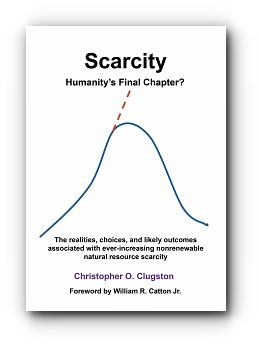| ||||||||||||
| Category: Environment |
(requires Adobe Reader)
|
| About the Book | |
|
Scarcity—Humanity’s Final Chapter? The realities, choices, and likely outcomes associated with ever-increasing nonrenewable natural resource scarcity... Foreword by William R. Catton Jr. (Author of “Overshoot”) “Chris Clugston has pulled together such an array of facts about the path ravenous humanity has trod and the consequences we now confront that no person who fails to read this book should be eligible for election to high office.” – William R. Catton Jr. Scarcity is a book about humanity’s “predicament”, which can be summarized as follows: the natural resource utilization behavior that enables our current “success”—our industrialized “American” way of life—and which is essential to perpetuating our success, is simultaneously undermining our very existence as a species. Our industrial lifestyle paradigm is enabled by enormous quantities of nonrenewable natural resources (NNRs)—i.e., the fossil fuels, metals, and nonmetallic minerals that serve as the raw material inputs to our industrialized economies, as the building blocks that comprise our industrialized infrastructure and support systems, and as the primary energy sources that power our industrialized societies. Ironically, since the inception of our industrial revolution over 200 years ago, we have been eliminating—persistently and increasingly—the finite and non-replenishing NNRs upon which our industrialized way of life and our very existence depend. As a result, most of the earth’s NNRs have become permanently scarce—i.e., there are not enough globally available, economically viable NNR supplies to completely address humanity’s global NNR requirements going forward. Based upon analyses derived from US Geological Survey (USGS) and US Energy Information Administration (EIA) data pertaining to domestic (US) and global NNR demand, supply, pricing, and utilization; Scarcity provides compelling, if not irrefutable, evidence to support this assertion; in addition to enumerating the causes, implications, and consequences associated with our predicament. Scarcity is essential reading for those who correctly perceive that the world, especially the industrialized “Western” world, is in a state of decline—decline that cannot possibly be reversed by our incessant barrage of misguided economic and political “fixes”. Scarcity will enable you to make sense of a world that is experiencing the most profound paradigm shift in human history. NNR scarcity is the most daunting challenge ever to confront humanity. If we Homo sapiens are truly an exceptional species, now is the time to prove it. "Scarcity is an impressive analysis of our present predicament. Far too many influential people are attempting to address that predicament with flagrantly misconceived notions about it, and most of what nations and their leaders are trying to do about today's troubles remains counterproductive. This you know, and you show it crisply and emphatically.” – William R. Catton Jr. Note: For those who are unfamiliar with William Catton, he published the seminal work on humanity’s “predicament”, entitled "Overshoot", in 1982. If you have not yet read "Overshoot", I strongly encourage you to do so; it is arguably the most important book written in the 20th century.
|
|
| Related Titles | |
|
|
| About the Author | |
 |
Since 2006, Chris has conducted extensive independent research into the area of “sustainability”, with a focus on nonrenewable natural resource scarcity. He received an AB/Political Science, Magna Cum Laude and Phi Beta Kappa from Penn State University, and an MBA/Finance with High Distinction from Temple University. |

